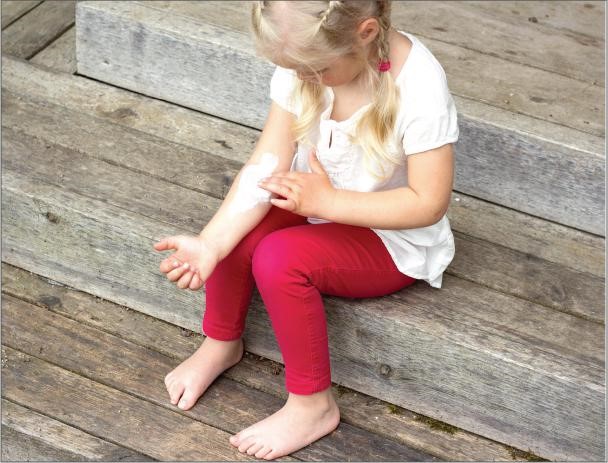Poison Ivy: Leaves of Three…let it be!
 The common phrase “leaves of three…let it be” gives fair warning for summer months when poison ivy is most prevalent. But why should one be so wary?
The common phrase “leaves of three…let it be” gives fair warning for summer months when poison ivy is most prevalent. But why should one be so wary?
If you have ever had poison ivy, that is not the question in your mind; you are wondering how you can never get it again. Well, one way is to never go outside… ever again. If that is not an acceptable answer (and it shouldn’t be acceptable), then the best way to avoid it is by recognizing it.
As you can see in the image contained in this article, the leaves of poison ivy are a medium shade of green and have a moderately waxy surface that somewhat reflects the light. The stems have a mildly reddish color to them. The leaves are almost always in a configuration of three (unless of course some poor lawn care person accidentally used the weedeater to cover his arms with tiny bits of the leaves, and yes, I did that at 16). The outer two leaves have the appearance of mittens with the thumbs pointing away from the middle (third) leaf. The middle leaf usually has a double thumb look to it.
Why is it so itchy? The oil on the stems, leaves and especially the root of the poison ivy plant is a very strong oil called urushiol. It does not easily wash off of surfaces, and it does not take much of the oil coming into contact with the skin of a person who is sensitive to its effects to set off a reaction. The good news is a little bit of dish detergent will have the power to break that oil up and get it off the skin.
There are all kinds of old tales about how poison ivy is contagious. One such tale is that if you scratch it, it will spread… not exactly true. The real concern is whether you have carefully washed the area of exposure to remove all the oil. If the oil is still there, then you could spread the oil to other parts of your body. Also, if the oil is on your clothes, boots, counter top, or any other surface, it can be spread back to other parts of your body through contact with those surfaces.
 However, the case of “spread” with poison ivy is usually not due to spread at all. It is often times the incredible memory of your immune system that causes so much itching. In the immune system, there are cells called T cells. It is the T cells job to act as “generals” in the army of the immune system. They recognize threats and coordinate all of the “troops” of the immune system to fight the threats off. When it comes to poison ivy, your T cells think that this oil is out to get you, and they try their best to fight it off. One of the great strengths of these “generals” in our immune system is their great memory. Whenever your T cells get “attacked” on your right forearm, they are not going to forget that. Two years later your left arm gets tangled up in the poison ivy vine and your left arm gets inflamed and itchy about 1-2 days after the contact. Next thing you know, at about day 3-4 from the exposure, just as you are getting your left arm’s itching under control, your right arm is getting all flared up. This is not spreading. It is the previous site of contact (yes, even up to 20 years later) flaring back up because the T cells remember being attacked there, and those “General” T cells have been guarding that right arm waiting for their enemy to come back.
However, the case of “spread” with poison ivy is usually not due to spread at all. It is often times the incredible memory of your immune system that causes so much itching. In the immune system, there are cells called T cells. It is the T cells job to act as “generals” in the army of the immune system. They recognize threats and coordinate all of the “troops” of the immune system to fight the threats off. When it comes to poison ivy, your T cells think that this oil is out to get you, and they try their best to fight it off. One of the great strengths of these “generals” in our immune system is their great memory. Whenever your T cells get “attacked” on your right forearm, they are not going to forget that. Two years later your left arm gets tangled up in the poison ivy vine and your left arm gets inflamed and itchy about 1-2 days after the contact. Next thing you know, at about day 3-4 from the exposure, just as you are getting your left arm’s itching under control, your right arm is getting all flared up. This is not spreading. It is the previous site of contact (yes, even up to 20 years later) flaring back up because the T cells remember being attacked there, and those “General” T cells have been guarding that right arm waiting for their enemy to come back.
With that in mind, remember to recognize the vine yourself (and teach your kids to recognize it). When, not if, you come into contact with it, just go home straight away and wash or scrub, that part of your skin with good dish soap, preferably out in the yard so you don’t track that pesky oil into the house. If that doesn’t work, you can always put some hydrocortisone cream on the area of inflammation for a few days, and keep watch for an old area flaring back up.
I hope these few tips can help your family have a fun filled summer. For more in depth information about the above topics, visit the websites below or speak with your pediatrician for further recommendations.
Chris Dodd, MD, PhD is a general pediatrician at Tennessee Pediatrics in Thompson’s Station. He is accepting new patients and is available for prenatal consultations, discussions about bug bites and poison ivy, or help planning your next great outdoor adventure.
VISIT THESE LINKS FOR MORE INFORMATION:
http://health.state.tn.us
http://www.cdc.gov
http://www.poolsafely.gov



